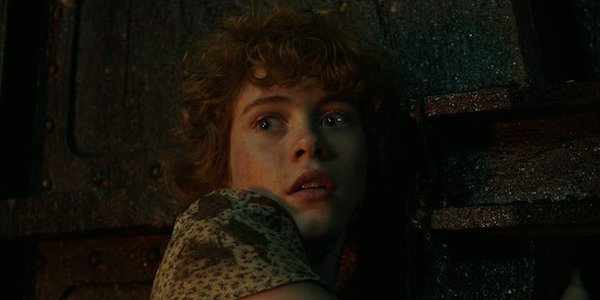Why IT Made That Major Change To Beverly In The Movie

Your Daily Blend of Entertainment News
You are now subscribed
Your newsletter sign-up was successful
Director Andres Muschietti's IT is a largely faithful adaptation to the Stephen King novel that inspired it -- but there are a few major differences to which fans can point. One of the most notable is the fact that Pennywise takes different forms to scare the members of the Losers Club -- with Stan, Mike, Ben, and Richie all getting spooked by original creations for the big screen. That being said, even Beverly's spotlight moment is changed, as the eruption of blood from her bathroom sink is accompanied by strands of hair binding and dragging her to the drain. It's ultimately an alteration that benefits the scene, and I recently talked with the director about its inception:
Bev's hair was enhanced and tied to the abuse that she's living with. I introduce that part with the hair, which is something that people don't expect, but it's tied because her father notices the big change in her by touching her hair. So she cuts her hair.
In Stephen King's book, Beverly Marsh keeps her long red hair throughout her childhood, but as Andres Muschietti pointed out when I spoke to him at the IT Los Angeles press day last month, that was something he wanted to change in his adaptation. In the interactions between Sophia Lillis' Beverly and her father, played by Stephen Bogaert, he strokes her hair in an immensely creepy way, and it's immediately clear to the audience that their relationship is anything but healthy. Bev cutting her hair in the bathroom is a clear rejection of her father's advances, and it becomes representative of her deepest fear when It uses presumably those same shorn locks later to trap her in the aforementioned red liquid explosion.
Of course, the hair also works in tandem with the larger metaphor that comes with the blood: the fact that Beverly is going through puberty and experiencing her period for the first time. This first comes into play for the character when we see her in the pharmacy looking nervously at the wall of tampons and pads, and Pennywise preys upon it when he gets the opportunity.
In my interview with Andres Muschietti and his sister, producer Barbara Muschietti, I made the connection between Beverly cutting her hair as a partial metaphor for her grappling with her own maturity. The IT director agreed, and added,
Exactly. She doesn't want to look like a woman to her father, because she senses something horrible will happen. Also, the object of his desire is expressed by touching her hair, so she cuts her hair and it goes into the sink. Then the symbol of that, basically her worst fear is that - the abuse, represented by the hair that she lost that's coming back again and is incarnated in Pennywise. It's not about blood. Blood is also related because of her changing body.
Of all the members of The Losers Club in IT, the treatment of Beverly in the narrative is easily one of the strongest, and is a big part of what makes the film great. There is a clear and apparent understanding of what Stephen King was doing with the character in the novel, and it shines thanks to a tremendous performance by Sophia Lills. Seeing what the sequel will do with the adult version of Beverly is one of the most exciting elements of the developing follow-up, and it's hard not to have confidence in the treatment.
IT is now in theaters everywhere, and be sure to stay on the lookout for more of our coverage here on CinemaBlend!
Your Daily Blend of Entertainment News

Eric Eisenberg is the Assistant Managing Editor at CinemaBlend. After graduating Boston University and earning a bachelor’s degree in journalism, he took a part-time job as a staff writer for CinemaBlend, and after six months was offered the opportunity to move to Los Angeles and take on a newly created West Coast Editor position. Over a decade later, he's continuing to advance his interests and expertise. In addition to conducting filmmaker interviews and contributing to the news and feature content of the site, Eric also oversees the Movie Reviews section, writes the the weekend box office report (published Sundays), and is the site's resident Stephen King expert. He has two King-related columns.
